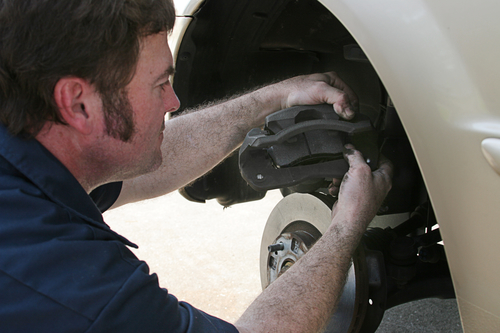What’s worse than a car that doesn’t run? A car that doesn’t stop! Brake inspection offers more than just peace of mind against a doomsday scenario, though. It’s much more common for brakes to lose their effectiveness than it is for them to fail completely.
There are two big reasons to get a brake inspection—and more often than you think, about every six months.
- The ability to brake quickly in a short distance can easily be the difference between a close call and a terrible accident.
- Your brake pads and discs can last quite a long time, but only if properly maintained. Fixing fluid leaks and replacing rusty fasteners are two examples of simple solutions during a brake inspection that could save you a fortune down the line.
When to Get a Brake Inspection
 As your local auto shop, you might think we’d be pressuring you to come in for a brake inspection every couple of months. However, we don’t want to lose your trust by pushing services you don’t need.
As your local auto shop, you might think we’d be pressuring you to come in for a brake inspection every couple of months. However, we don’t want to lose your trust by pushing services you don’t need.
If you’re wondering how often you really need a brake inspection, the real answer is that the answer varies. You’ll need one more often if you drive plenty or own an older vehicle.
For convenience and safety, most people can get all the preventive brake maintenance they need by requesting an inspection whenever they’re already at the auto shop. We’re talking about oil changes, tune-ups, and other routine car repair service. The point is to get a brake inspection every six months or so without having to come in for no other reason.
Do I Need Brake Service Immediately?
You know you need a brake inspection if a dashboard light comes on or you hear the brakes squealing. You might also feel something unusual when depressing the brake—a grinding or pulsing sensation, a hard metal-on-metal feeling, or just plain difficult braking.
Here’s what to keep in mind:
- What do brake warning lights mean? You might have a brake fluid leak or have lost too much fluid. Or, the sensor could be detecting worn-thin brake pads or a faulty master cylinder.
- Why are my new brakes pads squealing? Sometimes pads need time to get break in. It’s also possible you got low-quality brake pads or a bad installation. A brake inspection can determine if you need new rotors, a caliper adjustment, or something else to stop the brakes from squealing.
- Can I add brake fluid myself? If you’re certain that the brake fluid has been decreasing very gradually, you can add more. But it’s always safer to get a brake inspection to check for fluid leaks, especially if the problem started suddenly.
Brake Service near Santa Rosa, CA
Would you rather spend a couple thousand dollars on brake replacement several times over the course of owning your vehicle, or would you rather get cheaper repairs once or twice a year? If you’re like most people, you’d prefer to get a routine brake inspection from a trustworthy mechanic.
In Windsor, CA and the Santa Rosa area, expect an honest diagnosis from the experts at All Around Auto Repair. Contact us or call 707-837-0646 to schedule brake service.

